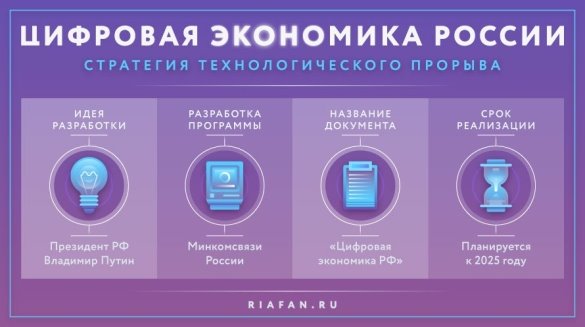In the context of intensive evolution of the information society and modern digital technologies, arise changes in the economic sphere connected with digitalization process. These trends have led to generation of new views on the economy as digital. But at the moment we haven’t got clear definition of this concept. In this article the author analyses several definitions of the concept «digital economy» considering different points of view.
Keywords: digital economy, e-economy, digitalization, information society.
Digitalization, as a global process of introducing information technologies in all branches of life, is unambiguously a global trend. Possessing the cross-cutting nature of action, it is also reflected in the economic sphere, which is manifested in the desire of a number of states in the world to create a so-called digital or electronic economy. However, at this stage of evolution of scientific knowledge, the question of the definition of the concept of «digital economy» remains open.
For the first time, the term «digital economy» was used by an American information technology specialist, Nicholas Negroponte, who proposed a concept of a digital economy in the form of a transition from the movement of atoms to the movement of bits contrasting the concepts of weight of raw materials and transport, as attributes of the past, to the concepts of lack of weight of goods and virtuality, as basic elements of the future [1].
Obviously, this concept presents an understanding of the term “digital economy”, based on the active development of post-industrial society and the growing importance of information technology in the 21st century. It should be noted that attempts to clarify the term “digital economy” are also being undertaken by Russian IT specialists.
So, the general director of Angara Group of Companies, the largest company specializing in information security systems, Sergey Sherstobitov believes that the definition of this concept is rather broad: “A broader definition is closer to me — a system of economic relations based on the use of digital information and communication technologies” — says Sherstobitov in an interview with the network journal «BIT: Business & Information Technologies» [2]. From our point of view, with such an interpretation of the concept of “digital economy”, the emphasis is not on a completely new understanding of economic processes, but on their course in a different way as information technologies develop.
The definition of the concept of «digital economy» is of interest to the Russian academic community. So, Doctor of Economics, Corresponding Member of the Russian Academy of Sciences Vladimir Ivanov gives the following definition of this concept: “the digital economy is a virtual environment that complements our reality” [1]. This interpretation, being the broadest, does not represent the electronic economy as a separate industry.
The chairman of the Moscow International Higher School of Business MIRBIS Dzhomart Aliyev reflects in the same vein: “For me, the digital economy does not exist as an independent one: there is a digital segment of the real economy, people are material beings living in a non-virtual world. So, the presence of digital contracts for the supply of oil is still based on the fact that oil for sale is needed in kind ” [3]. In addition, D. Aliyev explains that the development of the digital segment in the economy is advisable only where there is an increase in real economic indicators, thereby indicating their interconnection, and hence the failure of the perception of the digital economy as a new stage of economic development [3].
A more comprehensive definition of the concept of «digital economy» is presented by a professor, doctor of technical sciences, vice-rector for scientific work and innovation of Tomsk State University of Control Systems and Radio Electronics, Roman Meshcheryakov.
From his point of view, there are two approaches to the concept of “digital economy”: the classical one, in which it is presented as an information technology-based economy that works only in the field of electronic goods and services. The second approach: advanced is economic production using digital technologies [1].
Accordingly, the availability of these approaches to the interpretation of the concept of “digital economy”, in our opinion, indicates the uncertainty of the scale of this phenomenon.
Among other things, among researchers there is an understanding of the digital economy as a new progressive model of economic development. Thus, “the digital economy is a progressive economic model based on new methods of generating, processing and transmitting data, as well as digital computer technologies” [1].
Thus, it is obvious that the term “digital economy” is currently not clearly defined within the framework of Russian scientific schools. Moreover, opinions about the role and place of this phenomenon in the life of the modern state and society differ significantly.
However, one should not forget that the digital economy, like digitalization in general, is a global trend. Accordingly, attempts to clearly define this concept are undertaken by international organizations.
Thus, the Organization for Economic Cooperation and Development defines digital economy as: “a term used to describe markets that focus on digital technologies and relate to a range of economic, social and cultural activities supported by the Internet and other ICT technologies” [5], while there is a link with the sale of information services and goods.
It is worth noting that in this definition, the authors focus exclusively on the sale of digital goods, while products purchased via the Internet but not being digital will no longer belong to the digital economy [4].
The international company The Boston Consulting Group offers a slightly different definition of the term under investigation. Namely, the representatives of BCG note that: “a digital economy is a sphere of economic activity that includes online consumption, the cost of building the infrastructure of this consumption” [4].
After analyzing these definitions, it can be noted that their central aspect is the development of online commerce at a high level, as the main criterion of the digital economy.
It is important to note that the building of the digital economic system as a new, progressive version of the functioning of economic institutions is of great interest among the authorities in the Russian Federation. Moreover, the desire to move to the electronic basis of the economy was enshrined in the National Program «Digital Economy of the Russian Federation», which confirms the thesis about the significance of this strategy.
Thus, the definition of the concept of «digital economy» is one of the unresolved issues of modernity, and therefore the formation of doctrines on digitalization of the economic sphere, where the electronic economy is understood as a new stage in the development of society, in our view, is premature, even with a massive interest in it.

Fig. 1. The digital economy of Russia. Technological breakthrough strategy
References:
- Цифровая экономика: как специалисты понимают этот термин // РИА Новости. URL: https://ria.ru/20170616/1496663946.html (дата обращения: 22.05.2019).
- Цифровая экономика даст России шанс на рывок в будущее // ТАСС. URL: https://tass.ru/ekonomika/4390974 (дата обращения: 22.05.2019).
- Что важнее: реальная или цифровая экономика? // ИАЦ. URL: https://inance.ru/2017/09/cifrovaya-ekonomika/ (дата обращения: 22.05.2019).
- Цифровая экономика, цифровая трансформация. Как определить, измерить, повысить? // Broadcasting. Телевидение и радиовещание. URL: http://lib.broadcasting.ru/articles2/Oborandteh/tsifrovaya-ekonomika--tsifrovaya-transformatsiya-kak-opredelit--izmerit--povysit (дата обращения: 22.05.2019).
- Куратор российских ИТ назвал две главные цели цифровизации экономики // CNews. URL: http://www.cnews.ru/news/top/2018-10-16_v_pravitelstve_nazvali_strategicheskie_tseli_tsifrovizatsii (дата обращения: 22.05.2019).







